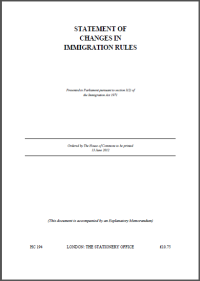At the heart of immigration decisions involving children lies the question of what is in the best interest of the child. There are two elements to the question. The first is the weight given to the best interests in the substantive decision on whether a child should be given leave to enter or remain and the second relates to how the best interests of the child are met within the process that leads to that decision.
Best interests are usually considered in the course of determining whether it would be a breach of the child's rights under Article 8 of the European Convention of Human Rights (ECHR) to be required to leave the UK.
Where a child is deemed not to satisfy the conditions for the grant of leave to remain in the UK there nonetheless remains the question of whether the child's best interest is served by returning him/her to their country of origin.
 With the advent of the new provisions within the Immigration Rules to consider the child's interests (Statement of Changes in Immigration Rules HC 194), into force 9 July 2012, one would have expected that what would have been considered is not just the "child's interests" but the "child's best interests", however the criteria fail to respect the best interest of the child. The new rules are nonetheless helpful in that they reintroduce the notion that the future of a child who has lived for more than seven years in the UK will normally lie in the UK. However, for other children who are not British citizens and have lived in the UK for less than 7 years, the test is "whether it would be reasonable to expect the child to leave the UK". This test is highly relevant to cases of decisions relating to whether a person with a "genuine and subsisting parental relationship" with the child in the UK should be allowed to remain in the UK.
With the advent of the new provisions within the Immigration Rules to consider the child's interests (Statement of Changes in Immigration Rules HC 194), into force 9 July 2012, one would have expected that what would have been considered is not just the "child's interests" but the "child's best interests", however the criteria fail to respect the best interest of the child. The new rules are nonetheless helpful in that they reintroduce the notion that the future of a child who has lived for more than seven years in the UK will normally lie in the UK. However, for other children who are not British citizens and have lived in the UK for less than 7 years, the test is "whether it would be reasonable to expect the child to leave the UK". This test is highly relevant to cases of decisions relating to whether a person with a "genuine and subsisting parental relationship" with the child in the UK should be allowed to remain in the UK.
Under the new rules a child's 7 years continuous residence (or the child of a British citizen) may provide a basis not to deport his or her parent from the UK where the parent has received a prison sentence of less than four years, but only if it would not be reasonable to expect the child to leave the UK and there is "no other family member able to care for the child" in the UK. Similarly, a child offender who has lived in the UK for at least half of his or her life and has received a sentence of less than four years may be spared deportation from the UK if he or she can show that they have no ties to their country of origin.
It may be argued that these tests are not in a child's best interest. The possibility of permanent separation of a child from a parent is fundamentally important and should not be taken lightly and whether or not a child meets the requirements of the tests cannot by itself taken to be the child's best interests.
It remains to be seen how the Secretary of State will address what can only be described as the uncertainty surrounding the future of the family life of children who are subjected to the new rules. If the rules are not met by a child but a grant of leave is made outside the rules, the period of uncertainty will be longer still as it will be 10 years rather than five before an application can be made for settlement.